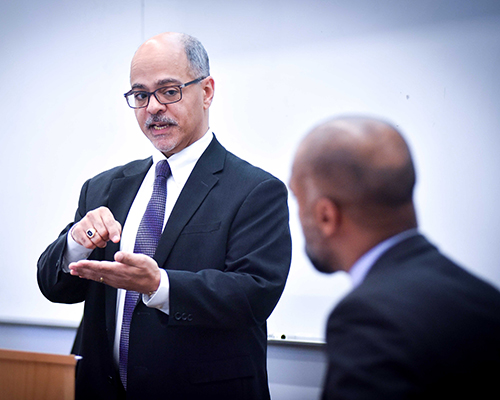US Judge Denies Ex-Mexican Govt. Official's Bid for Release Amid Pandemic
Former Mexican cabinet member Genaro García Luna is accused of assisting the powerful Sinaloa cartel while he served as Mexico's secretary of public security between 2006 and 2012, according to prosecutors who have linked his case to the powerful convicted drug kingpin Joaquin "El Chapo" Guzman.
March 31, 2020 at 05:18 PM
4 minute read
The original version of this story was published on New York Law Journal
 U.S. Magistrate Judge Ramon Reyes Jr., left, lecturing on information law.
U.S. Magistrate Judge Ramon Reyes Jr., left, lecturing on information law.
A magistrate judge in Brooklyn, New York decided Tuesday that former Mexican cabinet member Genaro García Luna will stay in jail, finding that the 51-year-old's lawyer had not proved that his client was at high risk during the COVID-19 outbreak.
García Luna is accused of assisting the powerful Sinaloa cartel while he served as Mexico's secretary of public security between 2006 and 2012, according to prosecutors who have linked his case to the powerful convicted drug kingpin known as El Chapo.
Prosecutors in the U.S. Attorney's Office for the Eastern District of New York said during the telephone hearing Tuesday that they're taking the coronavirus seriously, but officials in Brooklyn's Metropolitan Detention Center have compiled a list of high-risk inmates and García Luna is not on it.
The New York Law Journal monitored the proceedings remotely.
García Luna's lawyer, César de Castro, said he filed evidence, under seal, showing that García Luna had a medical issue related to his respiratory system a few years ago. De Castro said the issue recurred in 2019, but he didn't have documents to that effect.
At least one coronavirus case has been confirmed among inmates at the MDC, according to the Bureau of Prisons, and the facility is currently the subject of a proposed class-action lawsuit involving more than 500 at-risk inmates. De Castro said he's having trouble contacting García Luna at the MDC to ask about his current health.
"I know he's very scared and is very concerned that he will contract the virus and if he does, it will have a very significant effect," de Castro said.
U.S. Magistrate Judge Ramon Reyes Jr. denied García Luna's request for temporary release, saying that he hadn't provided any "definitive indication" that he suffers from a chronic respiratory issue or another health problem that would put him at high risk.
De Castro said after the hearing that he's considering an appeal to U.S. District Judge Brian Cogan, but he's struggling to reach his client at the MDC to discuss their options.
Reyes also rejected García Luna's request for release on bail, changing course from U.S. Magistrate Judge Robert Levy's conclusion at the end of February.
At that point, Levy had said García Luna's proposed bail package was not sufficient, but some other package might ensure his return to court.
On Tuesday morning, prosecutors spoke at length about their objections to the current bail package but eventually said they believed the case was not bailable at all.
Reyes agreed.
"I don't believe there are any conditions, or combinations of conditions, that can ensure Mr. García Luna's presence in court when necessary," he said. "Not to minimize the package that's been offered but I don't think it's sufficient. I'm not sure that — given the seriousness of the charges that Mr. García Luna faces and the potential, should he be found guilty, for a significant sentence — that he could resist the urge to flee."
The bail hearing was held by conference call in accordance with Monday's order from the Eastern District's Chief Judge Roslynn Mauskopf, which authorized judges to hold a wide array of proceedings by video or telephone for the next 90 days due to the coronavirus.
Nine minutes into the hearing, which lasted more than an hour, Reyes tried to rein in the number of stray beeps and scuffles audible on the crowded conference call. He repeatedly ordered everyone but the lawyers and court reporter to mute their phones.
"This is a public proceeding, but we have to act as if we were in court," he said. "Anyone in the gallery has to shut up."
Read more:
Federal Prosecutors Link Evidence Against Ex-Mexican Officials to El Chapo Case
US AG Barr Seeks to Expand Home Confinement to Halt Coronavirus Spread in Federal Prisons
Pressure Grows to Better Address Bail Applications as COVID-19 Hits NY Federal Jails
This content has been archived. It is available through our partners, LexisNexis® and Bloomberg Law.
To view this content, please continue to their sites.
Not a Lexis Subscriber?
Subscribe Now
Not a Bloomberg Law Subscriber?
Subscribe Now
NOT FOR REPRINT
© 2025 ALM Global, LLC, All Rights Reserved. Request academic re-use from www.copyright.com. All other uses, submit a request to [email protected]. For more information visit Asset & Logo Licensing.
You Might Like
View All
Hengeler Advises On €7B Baltica 2 Wind Farm Deal Between Ørsted and PGE
2 minute read
Israeli Firm Pearl Cohen Combines with San Francisco IP Boutique


Trending Stories
- 1Uber Files RICO Suit Against Plaintiff-Side Firms Alleging Fraudulent Injury Claims
- 2The Law Firm Disrupted: Scrutinizing the Elephant More Than the Mouse
- 3Inherent Diminished Value Damages Unavailable to 3rd-Party Claimants, Court Says
- 4Pa. Defense Firm Sued by Client Over Ex-Eagles Player's $43.5M Med Mal Win
- 5Losses Mount at Morris Manning, but Departing Ex-Chair Stays Bullish About His Old Firm's Future
Who Got The Work
J. Brugh Lower of Gibbons has entered an appearance for industrial equipment supplier Devco Corporation in a pending trademark infringement lawsuit. The suit, accusing the defendant of selling knock-off Graco products, was filed Dec. 18 in New Jersey District Court by Rivkin Radler on behalf of Graco Inc. and Graco Minnesota. The case, assigned to U.S. District Judge Zahid N. Quraishi, is 3:24-cv-11294, Graco Inc. et al v. Devco Corporation.
Who Got The Work
Rebecca Maller-Stein and Kent A. Yalowitz of Arnold & Porter Kaye Scholer have entered their appearances for Hanaco Venture Capital and its executives, Lior Prosor and David Frankel, in a pending securities lawsuit. The action, filed on Dec. 24 in New York Southern District Court by Zell, Aron & Co. on behalf of Goldeneye Advisors, accuses the defendants of negligently and fraudulently managing the plaintiff's $1 million investment. The case, assigned to U.S. District Judge Vernon S. Broderick, is 1:24-cv-09918, Goldeneye Advisors, LLC v. Hanaco Venture Capital, Ltd. et al.
Who Got The Work
Attorneys from A&O Shearman has stepped in as defense counsel for Toronto-Dominion Bank and other defendants in a pending securities class action. The suit, filed Dec. 11 in New York Southern District Court by Bleichmar Fonti & Auld, accuses the defendants of concealing the bank's 'pervasive' deficiencies in regards to its compliance with the Bank Secrecy Act and the quality of its anti-money laundering controls. The case, assigned to U.S. District Judge Arun Subramanian, is 1:24-cv-09445, Gonzalez v. The Toronto-Dominion Bank et al.
Who Got The Work
Crown Castle International, a Pennsylvania company providing shared communications infrastructure, has turned to Luke D. Wolf of Gordon Rees Scully Mansukhani to fend off a pending breach-of-contract lawsuit. The court action, filed Nov. 25 in Michigan Eastern District Court by Hooper Hathaway PC on behalf of The Town Residences LLC, accuses Crown Castle of failing to transfer approximately $30,000 in utility payments from T-Mobile in breach of a roof-top lease and assignment agreement. The case, assigned to U.S. District Judge Susan K. Declercq, is 2:24-cv-13131, The Town Residences LLC v. T-Mobile US, Inc. et al.
Who Got The Work
Wilfred P. Coronato and Daniel M. Schwartz of McCarter & English have stepped in as defense counsel to Electrolux Home Products Inc. in a pending product liability lawsuit. The court action, filed Nov. 26 in New York Eastern District Court by Poulos Lopiccolo PC and Nagel Rice LLP on behalf of David Stern, alleges that the defendant's refrigerators’ drawers and shelving repeatedly break and fall apart within months after purchase. The case, assigned to U.S. District Judge Joan M. Azrack, is 2:24-cv-08204, Stern v. Electrolux Home Products, Inc.
Featured Firms
Law Offices of Gary Martin Hays & Associates, P.C.
(470) 294-1674
Law Offices of Mark E. Salomone
(857) 444-6468
Smith & Hassler
(713) 739-1250








